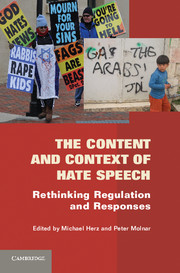Book contents
- Frontmatter
- Contents
- Contributors
- Foreword: Hate Speech and the Coming Death of the International Standard before It Was Born (Complaints of a Watchdog)
- Foreword: Hate Speech and Common Sense
- Acknowledgments
- Introduction
- Part I Overviews
- Part II Refinements and Distinctions
- 7 Social Epistemology, Holocaust Denial, and the Post-Millian Calculus
- 8 Denying Experience
- 9 What's Wrong with Defamation of Religion?
- 10 Responding to “Hate Speech” with Art, Education, and the Imminent Danger Test
- 11 Reconceptualizing Counterspeech in Hate Speech Policy (with a Focus on Australia)
- 12 Hate Speech and Self-Restraint
- 13 Hate Speech in Constitutional Jurisprudence
- 14 One Step Beyond Hate Speech
- 15 Hate Speech and Comprehensive Forms of Life
- Part III Equality and Fear
- Part IV International Law
- Index
- References
13 - Hate Speech in Constitutional Jurisprudence
A Comparative Analysis
Published online by Cambridge University Press: 05 June 2012
- Frontmatter
- Contents
- Contributors
- Foreword: Hate Speech and the Coming Death of the International Standard before It Was Born (Complaints of a Watchdog)
- Foreword: Hate Speech and Common Sense
- Acknowledgments
- Introduction
- Part I Overviews
- Part II Refinements and Distinctions
- 7 Social Epistemology, Holocaust Denial, and the Post-Millian Calculus
- 8 Denying Experience
- 9 What's Wrong with Defamation of Religion?
- 10 Responding to “Hate Speech” with Art, Education, and the Imminent Danger Test
- 11 Reconceptualizing Counterspeech in Hate Speech Policy (with a Focus on Australia)
- 12 Hate Speech and Self-Restraint
- 13 Hate Speech in Constitutional Jurisprudence
- 14 One Step Beyond Hate Speech
- 15 Hate Speech and Comprehensive Forms of Life
- Part III Equality and Fear
- Part IV International Law
- Index
- References
Summary
Introduction
Hate speech – that is, speech designed to promote hatred on the basis of race, religion, ethnicity, or national origin – poses vexing and complex problems for contemporary constitutional rights to freedom of expression. The constitutional treatment of these problems, moreover, has been far from uniform as the boundaries between impermissible propagation of hatred and protected speech vary from one setting to the next. There is, however, a big divide between the United States and other western democracies. In the United States, hate speech is given wide constitutional protection, whereas under international human rights covenants and in other western democracies, such as Canada, Germany, and the United Kingdom, it is largely prohibited and subjected to criminal sanctions.
The contrasting approaches adopted by the United States and other western democracies afford a special opportunity to embark on a comparative analysis of the difficult problems posed by hate speech and of the various possible solutions to them. As we shall see, in the United States, hate speech and the best ways to cope with it are conceived differently than in most other western democracies. This is due, in part, to differences in social context, and, in part, to differences in approach. It may be tempting, therefore, to endorse a purely contextual approach to hate speech encompassing a broad array of diverse constitutional responses ranging from American laissez faire to German vigilance. Given the trend toward globalization and the instant transnational reach of the Internet, however, a purely contextual approach would seem insufficient, if not downright inadequate. For example, much neo-Nazi propaganda is now generated in California and transmitted through the Internet to countries like Canada or Germany where neo-Nazi groups have established a much more significant foothold than in the United States. Inasmuch as such propaganda generally amounts to protected speech in the United States, there seems to be little that can be done to limit its spread beyond American soil. Does that justify calling for a change of constitutional jurisprudence in the United States? Or, more generally, do present circumstances warrant a systematic rethinking of constitutional approaches to hate speech?
- Type
- Chapter
- Information
- The Content and Context of Hate SpeechRethinking Regulation and Responses, pp. 242 - 289Publisher: Cambridge University PressPrint publication year: 2012
References
- 17
- Cited by



